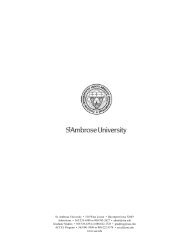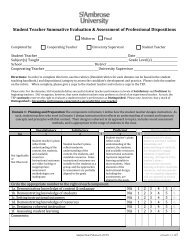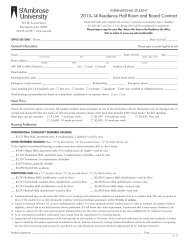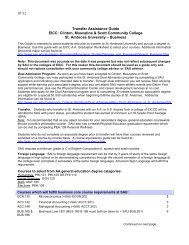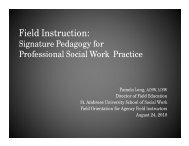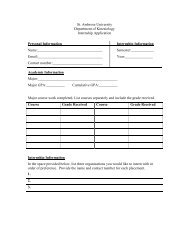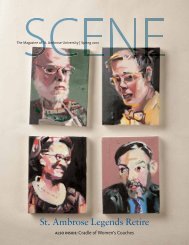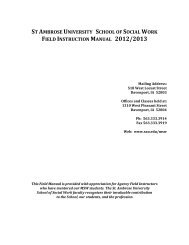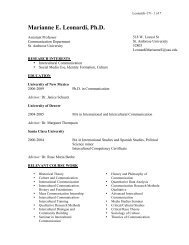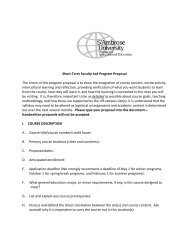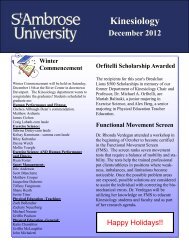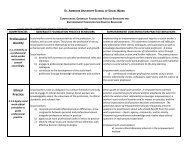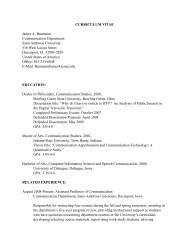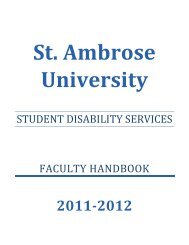St. Ambrose University 518 West Locust Davenport Iowa 52803 admit
St. Ambrose University 518 West Locust Davenport Iowa 52803 admit
St. Ambrose University 518 West Locust Davenport Iowa 52803 admit
You also want an ePaper? Increase the reach of your titles
YUMPU automatically turns print PDFs into web optimized ePapers that Google loves.
Graduate Curricula<br />
the clinical appearance of disease. Initial work<br />
will include a study of the basic pathologic<br />
processes followed by a systematic look at diseases<br />
that affect the various organ systems of the<br />
body. Prerequisite: HS 250, BIO 202, 204.<br />
HS 501. Pharmacology for the Health<br />
Professional<br />
2 credits<br />
This course studies the basic pharmacologic principles<br />
and application to rehabilitation therapy.<br />
Pharmacotherapeutic agents will be discussed<br />
based on a combination of organ systems and<br />
general drug classifications to provide the rationale<br />
of drug therapy. Emphasis will be placed on<br />
the types of disorders these agents treat, adverse<br />
effects they cause and special implications of specific<br />
drugs to the therapist. Prerequisite: HS 500.<br />
MOT 255. Orientation to OT<br />
1 credit<br />
This introductory course to the profession of<br />
Occupational Therapy addresses professional terminology/definitions,<br />
core values and tools of<br />
practice, licensure certification and educational<br />
requirements to enter the profession as well as<br />
current roles of occupational therapists within a<br />
variety of practice areas.<br />
MOT 410. Foundations of Occupation 3 credits<br />
This course introduces the concepts and strategies<br />
related to the use of self as a therapeutic agent in<br />
occupational therapy practice. Concepts include<br />
the underlying premise that occupation is the<br />
source of satisfaction throughout the life span,<br />
the therapist’s role in facilitating positive adaptation,<br />
and the therapist’s role in using the tools of<br />
the profession therapeutically. <strong>St</strong>udents are introduced<br />
to multi-cultural issues in therapy.<br />
MOT 420. Fundamentals of<br />
Purposeful Activity<br />
3 credits<br />
This course focuses on the development of critical<br />
thinking skills as they are related to the selection<br />
of purposeful activities in occupational therapy.<br />
Two specific aspects will be examined: purposeful<br />
activity within the context of the profession<br />
of occupational therapy as well as purposeful<br />
activities given an individual’s treatment<br />
needs. This course will assist the student in developing<br />
skills in activity analysis, synthesis,and reasoning.<br />
This course will also identify how developmental<br />
and multicultural differences may influence<br />
an individual’s interests, concerns and<br />
response to therapy.<br />
MOT 430. Introduction to<br />
OT Group Theory<br />
2 credits<br />
Group leadership skills following a seven-step<br />
format will be developed. <strong>St</strong>udents will gain an<br />
understanding of group dynamics including<br />
group process, development, norms and roles,<br />
termination as well as dealing with special client<br />
populations. Introduction to occupational therapy<br />
group theories and frames of reference.<br />
<strong>St</strong>udents will develop critical thinking skills<br />
regarding group dynamics and group leadership<br />
in the selection of appropriate occupational therapy<br />
interventions utilized in a group setting.<br />
MOT 440. OT Applied Kinesiology 3 credits<br />
This course includes the study of the active and<br />
passive structures involved in movement and the<br />
internal and external forces that impact movement.<br />
<strong>St</strong>udents will study and learn to evaluate<br />
normal movement and analyze the impact that<br />
abnormal movement will have on an individuals’<br />
occupation. Also students will learn how to utilize<br />
the biomechanical approach in treatment to<br />
improve function. Prerequisite: BIO 202, 204.<br />
MOT 450. History and Philosophy<br />
of OT<br />
3 credits<br />
This course is designed to explore the historical<br />
development of the occupational therapy profession<br />
from a sociopolitical perspective and to<br />
identify the various philosophical approaches to<br />
understanding health and the human as an occupational<br />
being. The student will learn about the<br />
founders of the profession, the underlying principles<br />
of the profession, and the significance of theories,<br />
models, and frames of reference upon the<br />
form and function of occupational therapy.<br />
206



